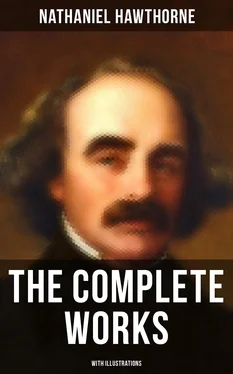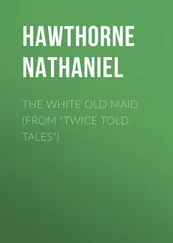There was a vertical sundial on the front gable; and as the carpenter passed beneath it, he looked up and noted the hour.
“Three o’clock!” said he to himself. “My father told me that dial was put up only an hour before the old Colonel’s death. How truly it has kept time these seven-and-thirty years past! The shadow creeps and creeps, and is always looking over the shoulder of the sunshine!”
It might have befitted a craftsman, like Matthew Maule, on being sent for to a gentleman’s house, to go to the back door, where servants and work-people were usually admitted; or at least to the side entrance, where the better class of tradesmen made application. But the carpenter had a great deal of pride and stiffness in his nature; and, at this moment, moreover, his heart was bitter with the sense of hereditary wrong, because he considered the great Pyncheon House to be standing on soil which should have been his own. On this very site, beside a spring of delicious water, his grandfather had felled the pine-trees and built a cottage, in which children had been born to him; and it was only from a dead man’s stiffened fingers that Colonel Pyncheon had wrested away the title-deeds. So young Maule went straight to the principal entrance, beneath a portal of carved oak, and gave such a peal of the iron knocker that you would have imagined the stern old wizard himself to be standing at the threshold.
Black Scipio answered the summons in a prodigious, hurry; but showed the whites of his eyes in amazement on beholding only the carpenter.
“Lord-a-mercy, what a great man he be, this carpenter fellow!” mumbled Scipio, down in his throat. “Anybody think he beat on the door with his biggest hammer!”
“Here I am!” said Maule sternly. “Show me the way to your master’s parlor.”
As he stept into the house, a note of sweet and melancholy music thrilled and vibrated along the passageway, proceeding from one of the rooms above stairs. It was the harpsichord which Alice Pyncheon had brought with her from beyond the sea. The fair Alice bestowed most of her maiden leisure between flowers and music, although the former were apt to droop, and the melodies were often sad. She was of foreign education, and could not take kindly to the New England modes of life, in which nothing beautiful had ever been developed.
As Mr. Pyncheon had been impatiently awaiting Maule’s arrival, black Scipio, of course, lost no time in ushering the carpenter into his master’s presence. The room in which this gentleman sat was a parlor of moderate size, looking out upon the garden of the house, and having its windows partly shadowed by the foliage of fruit-trees. It was Mr. Pyncheon’s peculiar apartment, and was provided with furniture, in an elegant and costly style, principally from Paris; the floor (which was unusual at that day) being covered with a carpet, so skilfully and richly wrought that it seemed to glow as with living flowers. In one corner stood a marble woman, to whom her own beauty was the sole and sufficient garment. Some pictures — that looked old, and had a mellow tinge diffused through all their artful splendor — hung on the walls. Near the fireplace was a large and very beautiful cabinet of ebony, inlaid with ivory; a piece of antique furniture, which Mr. Pyncheon had bought in Venice, and which he used as the treasure-place for medals, ancient coins, and whatever small and valuable curiosities he had picked up on his travels. Through all this variety of decoration, however, the room showed its original characteristics; its low stud, its cross-beam, its chimney-piece, with the old-fashioned Dutch tiles; so that it was the emblem of a mind industriously stored with foreign ideas, and elaborated into artificial refinement, but neither larger, nor, in its proper self, more elegant than before.
There were two objects that appeared rather out of place in this very handsomely furnished room. One was a large map, or surveyor’s plan, of a tract of land, which looked as if it had been drawn a good many years ago, and was now dingy with smoke, and soiled, here and there, with the touch of fingers. The other was a portrait of a stern old man, in a Puritan garb, painted roughly, but with a bold effect, and a remarkably strong expression of character.
At a small table, before a fire of English seacoal, sat Mr. Pyncheon, sipping coffee, which had grown to be a very favorite beverage with him in France. He was a middle-aged and really handsome man, with a wig flowing down upon his shoulders; his coat was of blue velvet, with lace on the borders and at the buttonholes; and the firelight glistened on the spacious breadth of his waistcoat, which was flowered all over with gold. On the entrance of Scipio, ushering in the carpenter, Mr. Pyncheon turned partly round, but resumed his former position, and proceeded deliberately to finish his cup of coffee, without immediate notice of the guest whom he had summoned to his presence. It was not that he intended any rudeness or improper neglect, — which, indeed, he would have blushed to be guilty of, — but it never occurred to him that a person in Maule’s station had a claim on his courtesy, or would trouble himself about it one way or the other.
The carpenter, however, stepped at once to the hearth, and turned himself about, so as to look Mr. Pyncheon in the face.
“You sent for me,” said he. “Be pleased to explain your business, that I may go back to my own affairs.”
“Ah! excuse me,” said Mr. Pyncheon quietly. “I did not mean to tax your time without a recompense. Your name, I think, is Maule, — Thomas or Matthew Maule, — a son or grandson of the builder of this house?”
“Matthew Maule,” replied the carpenter, — ”son of him who built the house, — grandson of the rightful proprietor of the soil.”
“I know the dispute to which you allude,” observed Mr. Pyncheon with undisturbed equanimity. “I am well aware that my grandfather was compelled to resort to a suit at law, in order to establish his claim to the foundation-site of this edifice. We will not, if you please, renew the discussion. The matter was settled at the time, and by the competent authorities, — equitably, it is to be presumed, — and, at all events, irrevocably. Yet, singularly enough, there is an incidental reference to this very subject in what I am now about to say to you. And this same inveterate grudge, — excuse me, I mean no offence, — this irritability, which you have just shown, is not entirely aside from the matter.”
“If you can find anything for your purpose, Mr. Pyncheon,” said the carpenter, “in a man’s natural resentment for the wrongs done to his blood, you are welcome to it.”
“I take you at your word, Goodman Maule,” said the owner of the Seven Gables, with a smile, “and will proceed to suggest a mode in which your hereditary resentments — justifiable or otherwise — may have had a bearing on my affairs. You have heard, I suppose, that the Pyncheon family, ever since my grandfather’s days, have been prosecuting a still unsettled claim to a very large extent of territory at the Eastward?”
“Often,” replied Maule, — and it is said that a smile came over his face, — ”very often, — from my father!”
“This claim,” continued Mr. Pyncheon, after pausing a moment, as if to consider what the carpenter’s smile might mean, “appeared to be on the very verge of a settlement and full allowance, at the period of my grandfather’s decease. It was well known, to those in his confidence, that he anticipated neither difficulty nor delay. Now, Colonel Pyncheon, I need hardly say, was a practical man, well acquainted with public and private business, and not at all the person to cherish ill-founded hopes, or to attempt the following out of an impracticable scheme. It is obvious to conclude, therefore, that he had grounds, not apparent to his heirs, for his confident anticipation of success in the matter of this Eastern claim. In a word, I believe, — and my legal advisers coincide in the belief, which, moreover, is authorized, to a certain extent, by the family traditions, — that my grandfather was in possession of some deed, or other document, essential to this claim, but which has since disappeared.”
Читать дальше












